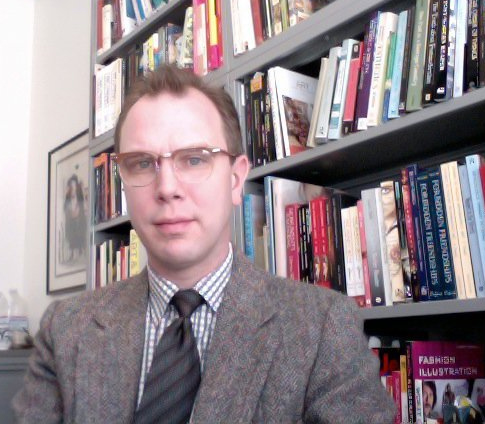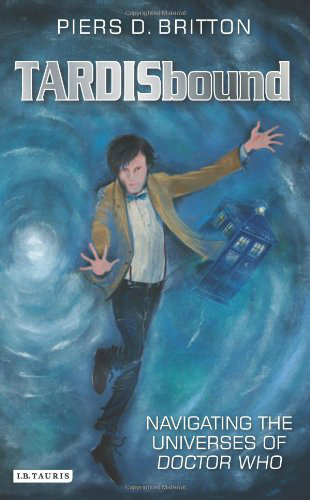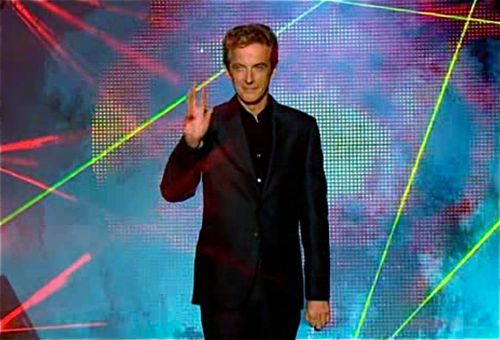Discussing Doctor Who With an Expert Professor, Who’s a Bigger Fan Than You
 |
Dr. Piers D. Britton, associate professor of Visual and Media Studies at the University of Redlands, literally wrote the book on Doctor Who – it’s called TARDISbound, and encompasses not only the TV show, but also the audioplays and novels. Described as an expert on the subject, he has also been teaching a class about our favorite Time Lord’s role as part of a global transmedia institution and a transformational figure who allows viewers to experience their own multiple realities.
With the fiftieth anniversary episode coming this weekend, we could hardly miss a chance to ask the expert for his take, and it’s fair to say I had a good talk with great Britton on just what it is that’s at the heart(s) of the show’s appeal – and whether he could imagine a female or black Doctor any time soon.
Luke Y. Thompson: So tell me what qualifies you as an expert on Doctor Who, beyond the psychic paper you’re probably holding?
Piers Britton: Yes, which is not entirely useful at the end of a phone, but it’s a comfy blanket. What qualifies me? Well, I wrote a book on design for three British television series [Reading Between Designs], one of which was Doctor Who. I co-wrote the book, in 2003 it came out, on the strength of which I was approached by the publisher I.B. Tauris to consider writing a book on all of Doctor Who, not just the television manifestations, but also the original novels, and the audio dramas that have been produced at various times, about 1990 in the case of the novel, and since 1999 in the case of the audio dramas.
I’m really interested in Doctor Who as it operates across media. And obviously, as I’ve already suggested, my primary interest at large is in design. Doctor Who is very rich in good design, contrary to all of the accusations about wobbly sets.
LYT: Well, wobbliness isn’t inherently a part of the design, I would guess.
PB: Well, yeah – that. I think the stories of poor execution are greatly exaggerated. I think Toby Hadoke it was who did – actually counted the number of sets that wobbled on Doctor Who, and there are rather fewer than popular persiflage suggests. That’s my background.
 |
LYT: So the course you teach on the show – is it primarily a design-based course then?
PB: No, not this course that I’m teaching right now. I have taught for several years an intense one-month class in May, which I co-teach with June Hudson, who was a designer on Doctor Who in the late 70’s and early 80’s, and that is Doctor Who themed. So I do teach a kind of hybrid humanities/arts class. This particular class is quite different. In character, it’s much more about textual analysis – it much more stems from the work that I did on my most recent book, TARDISbound.
LYT: The show has been around for – not just in England, but over here for a long time. My mother-in-law remembers seeing some of the early ones on PBS, but why do you think it is that the current incarnation has gained a lot more fandom than the previous version in the US?
PB: Well, it looks much more like American programming has looked since the 1960s – that’s the first thing. There are a number of people who can’t watch old Doctor Who because it was made in the traditional manner that anything recorded in the electronic studios made with multiple cameras – typically low-definition image, saturation, flat lighting – it didn’t look at all cinematic. Whereas obviously science fiction, all the way back to Star Trek and beyond, in the U.S. has tended to have a veneer of sophistication, at the very least.
So I think that’s part of it. I think more narrowly, we can point to a U.S. precedence in genre fiction on television that has informed the way Doctor Who has been done since a decade ago when Russell T. Davies started the reboot process, which is to say that it fits in very neatly with Battlestar Galactica – the reimagined Galactica – and in different ways with Heroes, or Buffy and The X-Files. I think the context was ripe for it to return, if it was done well for U.S. audiences in the mid-“noughties”, as they call them in the U.K. – in a way that the context wasn’t even ripe for it to succeed in Britain by the late ’80s, for all kinds of reasons. There’s been a shift that’s created a nest that it could live in. I think that’s the best way to put it.
LYT: Do you think having him be more of a younger, sort of romantic leading man type for the last few seasons was key to it as well?
PB: I certainly do. I think that’s key to its mainstream appeal pretty much everywhere, not just in the U.S. But again, the aping of U.S. genre programming – here, Buffy really does emerge as the kind of germinal text, the “will they/won’t they?” aspect of the Doctor’s relationship with his companion. That’s something that is comfortable for audiences, it’s familiar, and it remains to be seen how that will change with Peter Capaldi. Matt Smith I think was a risk in all kinds of ways. He’s much too much like old Doctor Who in lots of ways, and personally, that’s not a problem, but that’s been a concern for some. It’s often been pointed out by my students, there’s a pretty clear divide between Tennant fans and Smith fans, so it will be interesting to see how that works when you don’t have the leading man and the leading woman essentially in the same age bracket. That’s going to be a real challenge for Doctor Who.
 |
LYT: I grew up overseas, and I grew up with the old Doctor Who, and it always seemed to me that one of the primary appeals, when I look back on it, was that he was sort of like that older, eccentric teacher that you once had that you really loved, as opposed to the sort of handsome prince that you want to run away with. I feel like maybe it got away from that more recently.
PB: Well, it did, but that really didn’t do it any harm. It reinvented itself very brilliantly. My own preference is definitely for the eccentric, endearing teacher who probably isn’t that endearing when you scratch the surface, rather than the writ large heroism and anti-heroism of, for example, the David Tennant Doctor. So yeah, historically that looks like a major departure, but again, to many of my students, the long history of Doctor Who doesn’t seem that relevant. To them, the Doctor has always been 40 or younger. The era of the young Doctor makes the return to the eccentric boffin, or geography teacher, whatever, more problematic. That’s why I think when the pendulum swings, it will be interesting to see how far they can take it.
LYT: That’s interesting what you said about him not necessarily being sympathetic under the surface. Do you see him more as an anti-hero than perhaps people perceive him as?
PB: Yeah, he’s always been that. The least interesting Doctors for me have been the most obviously heroic ones. Jon Pertwee played it straight and talked no-nonsense, and was generally all around a good establishment egg, and I think the more dangerous Doctors tended to be more interesting. Sometimes that’s been overplayed, and one of the many things that poor Colin Baker suffered with in the mid-’80s was the fact that they went too far in making him anti-heroic.
You have to consider, this is a show that starts with the primary character, the titular character, in the third episode, contemplating seriously caving a man’s head in with a stone. The Doctor has never been uncomplicatedly a nice guy. I think his alien-ness, both that which throws our humanity into relief, because he exhibits that, and that which shows the shadow side of our humanity into relief, because he exhibits that too. That clash between the humane and the inhumane is part of the fascination of the character. It’s the thing you can do with Doctor Who that you can’t do as effectively with something like, say, Batman.
 |
LYT: Do you think there is any issue with having the Doctor be a woman, or a different race, as people were calling for the last time around?
PB: No – you know, I’m kind of conflicted about this, because obviously, as lefty liberal as I am, I think the time is ripe for Doctor Who to walk the talk of its inclusiveness. On the other hand, I can’t see any reason for an arbitrary change. One of the things I like most about the mini-sode that was on the other night, “The Night of the Doctor,” that was I think really directed at people my age group in many ways, was the fact that it for the first time put on the table, not just the possibility of the Doctor becoming a woman, but of the Doctor choosing to be a woman. I do tend to agree that that kind of blind casting doesn’t make any sense.
I think if you’re going to do something different, there needs to be a rationale for it, whether that’s a particular performer rising to the surface in people’s minds as an obvious choice, which is what people claim was made about Capaldi, or whether it’s very deliberately, “OK, we’ve reached thirteen, a new regeneration cycle – let’s recast it as a woman.”
I certainly don’t think it’s problematic. I think the joy of Doctor Who is that it at least creates a space where you can explore alternative identities and subjectivities and stuff like that. And for the Doctor to be something different again would be, I think, just more fun. I don’t think it’s something to be fearful about. I quite understand why people got bent out of shape when it wasn’t someone of a different ethnicity or a woman, but I think the show can accommodate it, and assuming that it continues to be successful. But again, I think if the show doesn’t accommodate the return to an older man, then all that could be a moot point, because we might never have a thirteenth doctor.
LYT: So who has been your favorite one overall?
PB: I can’t really answer that. I have too much of a complex love/hate relationship with Doctor Who. The Doctor I grew up with was Tom Baker, for personal reasons, among others, he went to college with my mother – there are all kinds of connections there, I grew up with him, and I’m still a little bit in denial that he isn’t the Doctor anymore.
But the different phases of my interaction with Doctor Who have yielded different favorite Doctors. I think Matt Smith will never be surpassed. I think he’s superb. But I also loved Paul McGann. We got whatever it was of him – not even 60 minutes of him in 1996, and then he moved to making Doctor Who on audio. I think he’s a wonderful Doctor – I was thrilled to see him back in “The Night of the Doctor,” so I kind of have three favorite Doctors – that would be 4, 8 and 11.
LYT: So conversely, is Pertwee, who you mentioned before, your least favorite one?
PB: Oh, no – Tennant is quite comfortably my least favorite, I will say! [chuckles]It’s nothing to do with the actor, I just don’t think that that Doctor ended up being well-conceived, and speaking of issues about difference, I still don’t understand why he couldn’t have spoken with his native accent. The claim was we couldn’t have two regional doctors one after the other – I don’t buy that. So I think that the character that Russell T. Davies created based on Tennant’s performance ended up being rather tiresome. But Pertwee, yeah – I think he’s probably the least interesting. You can’t, if you’re my age group, he’s such a kind of father figure – you can’t escape him, you can’t hate him, but I just think he’s – compared to his immediate predecessor and immediate successor – really not that interesting.
LYT: Do you think, or do you know – are they going to let Capaldi speak in his natural Scottish accent, or are they going to make him sound more English?
PB: What I’m hearing at this point is that he will probably speak with his own accent.
LYT: So we’ll finally get a Scottish one.
PB: We’ll get a second Scottish one.
LYT: One who sounds Scottish, as opposed to one who didn’t sound it. So what are you expecting from the 50th anniversary episode?
PB: Well, at this point of course, my expectations are being thoroughly led by the press releases and the various utterances of Steven Moffat. I think it’s clear that he’s trying to dodge the bullet of pleasing all the fans, which of course he’s never going to do, by moving the story forward, even as it looks back not only at Doctor Who‘s history, but also the Doctor’s own personal history. So I’m excited to see where he goes. Something he’s done very ably, I think, is to sort of clean up after Russell T. Davies, and while one doesn’t need that – all these big ideas and names that Davies would casually toss out enriched the series – I’m loving the thing that Moffat does where he takes an idea that Davies had started with and plays with it, and I think that’s what we’re going to be treated to. It’s nice that as well as bringing back the inevitable Doctor Who villain in the form of Daleks, we also get the Zygons, which is particularly nice for me, because Terror of the Zygons in 1975 was the serial that hooked me and made me a Doctor Who fan, so I’m kind of thrilled about that.
So I think it’s going to be provocative, and I think it’s going to be less celebratory than it is probably quite dark, actually. And I think the intent is to propel us forward and I’m hoping that’s what he manages to do.
LYT: Do you have more different Doctor Who courses planned after this one?
PB: No, this is a one-shot deal. As I say, kind of a love/hate relationship with Doctor Who, and writing about it for a number of years doesn’t make it actually any easier to teach. I’m kind of happy to compartmentalize my life, I think, and not do it again. But it seemed unthinkable, having written this book quite recently, not to teach one class in the anniversary season.
